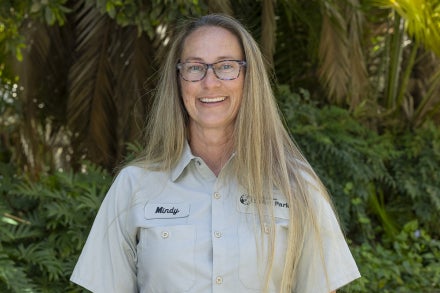FOR IMMEDIATE RELEASE
CONTACT:
San Diego Zoo Wildlife Alliance
Public Relations
619-685-3291
publicrelations@sdzwa.org
sdzwa.org
NEWS RELEASE
‘Toss the Tusk’ Event at San Diego Zoo Encourages the Public to Surrender Wildlife Products Including Ivory
Collection of These Items Helps Reduce the Demand Driving Wildlife Trafficking
SAN DIEGO (May 14, 2024) – Today San Diego Zoo Wildlife Alliance hosted a “Toss the Tusk” event at the San Diego Zoo to raise awareness about the elephant poaching crisis and illegal elephant ivory trade. The event, organized by the Association of Zoos and Aquariums’ Wildlife Trafficking Alliance (AZA WTA) and the U.S. Fish and Wildlife Service (USFWS), encouraged the public to support long-term conservation efforts by surrendering unwanted elephant ivoryitems—including jewelry and art pieces—to ensure their availability does not drive demand. By removing elephant ivory products from the market, we can help keep these majestic animals alive for generations to come. This is the second year in a row that San Diego Zoo Wildlife Alliance has hosted a Toss the Tusk event. In 2023, it was held at the San Diego Zoo Safari Park.
To kick off the daylong Toss the Tusk event, Erika Kohler, senior vice president and executive director, San Diego Zoo, welcomed special guests from the AZA, USFWS and California Department of Fish and Wildlife. Guests had the opportunity to meet with representatives from these organizations, who shared information about elephant conservation and the illegal wildlife trade. Law enforcement detection canines were also present, and examples of ivory products were on display to further educate guests of all ages. San Diego Zoo Wildlife Alliance team members were available to answer questions about the Alliance’s deep commitment to the protection and conservation of African elephants. That work includes supporting efforts in Kenya led by local communities to promote coexistence between people and elephants.
“Today, we are honored to host ‘Toss the Tusk’ for the second consecutive year,” said Kohler. “This collaborative event is especially important to highlight the challenges facing elephants around the world—and bring us together as people to be a part of the solution and help end the trafficking of wildlife products. Events like these, when we unite as a team of conservationists, create hope for Earth’s gentle giants. Elephants are the landscape engineers of their ecosystem and remind us how we all can play a role in securing their future, and the future of wildlife around the world.”
Thousands of elephants are killed each year to fuel the global demand for ivory. African elephant populations alone have fallen from an estimated 12 million a century ago to around 415,000 individuals as of 2016. As a result of global conservation efforts, poaching rates have been slightly, yet steadily, declining over the past few years across Africa, but elephants are still being lost faster than they can reproduce. International commercial trade in elephant ivory is prohibited under the Convention on International Trade in Endangered Species of Wild Fauna and Flora (CITES). In the United States, elephants are protected by the Endangered Species Act of 1973. The ivory trade is further restricted by the African Elephant Conservation Act and other laws. In 2016, a near-total ban on the commercial trade of African elephant ivory went into effect in the United States. California is one of the largest markets for the sale of illegal ivory in the United States.
Regulations do not restrict personal possession of ivory, provided it was lawfully acquired. If you already own ivory—such as an heirloom carving that’s been passed down in your family or a vintage musical instrument with ivory components—you can still legally own those pieces. By surrendering elephant ivory, individuals can ensure these products will never be made available for sale. Removing ivory products from the market can keep elephants alive for generations to come.
African elephants are currently listed as Endangered on the International Union for Conservation of Nature (IUCN) Red List of Threatened Species and face many threats in their native habitats, including drought, illegal wildlife trafficking, habitat loss and degradation and challenges to human-wildlife coexistence.
For decades, San Diego Zoo Wildlife Alliance has worked alongside partners in Kenya using a highly collaborative, innovative and multidisciplinary approach to address pressing threats to elephant conservation and African savanna ecosystems. Scientific studies conducted in both Africa and with the elephant herds at the San Diego Zoo and Safari Park provide a unique opportunity to increase the understanding of the species and help develop additional conservation solutions. Increasing knowledge of the complexity of elephant social behaviors and the understanding of their overall health needs has given San Diego Zoo Wildlife Alliance and its partners valuable insight into what successful conservation outcomes look like for elephants.
Since 2019, WTA’s Toss the Tusk events have received over one thousand relinquished wildlife products. In addition to the Toss the Tusk event at the San Diego Zoo, AZA WTA and USFWS will hold two additional Toss the Tusk events in 2024: at the Phoenix Zoo and Zoo Miami. For more information, visit https://www.aza.org/wta-toss-the-tusk. After the event, the public can continue to participate in the campaign by contributing items to the U.S. Fish and Wildlife Service National Wildlife Property Repository. They can also take action by learning more about wildlife trafficking, purchasing souvenirs mindfully and encouraging friends and family to also be wise consumers. Report wildlife crime to 1-844-FWS-TIPS (1-844-397-8477) or online at the U.S. Fish and Wildlife Service Wildlife Crime Tips page: https://www.fws.gov/wildlife-crime-tips.
###
About San Diego Zoo Wildlife Alliance
San Diego Zoo Wildlife Alliance, a nonprofit conservation leader, inspires passion for nature and collaboration for a healthier world. The Alliance supports innovative conservation science through global partnerships. Through wildlife care, science expertise and collaboration, more than 44 endangered species have been reintroduced to native habitats. Annually, the Alliance reaches over 1 billion people, in person at the San Diego Zoo and San Diego Zoo Safari Park, and virtually in 150 countries through media channels, including San Diego Zoo Wildlife Explorers television programming in children’s hospitals in 14 countries. Wildlife Allies—members, donors and guests—make success possible.
About the Association of Zoos and Aquariums (AZA)
Founded in 1924, the Association of Zoos and Aquariums is a nonprofit organization dedicated to the advancement of zoos and aquariums in the areas of conservation, animal welfare, education, science, and recreation. AZA is the accrediting body for the top zoos and aquariums in the United States and 12 other countries. Look for the AZA accreditation logo whenever you visit a zoo or aquarium as your assurance that you are supporting a facility dedicated to providing excellent care for animals, a great experience for you, and a better future for all living things. The AZA is a leader in saving species and your link to helping animals all over the world. To learn more, visit www.aza.org.
About AZA’s Wildlife Trafficking Alliance (WTA)
The Wildlife Trafficking Alliance (WTA) is a coalition of more than 100 leading companies, non-profit organizations, and AZA-accredited zoos and aquariums working together to reduce, and eventually eliminate, the illegal trade of wildlife and wildlife products. To learn more, visit aza.org/wildlife-trafficking-alliance.
About the U.S. Fish & Wildlife Service (USFWS)
The U.S. Fish and Wildlife Service works with others to conserve, protect and enhance fish, wildlife, plants and their habitats for the continuing benefit of the American people. For more information, visit www.fws.gov, or connect with us on social media: Facebook, X (formerly known as Twitter), YouTube and Flickr. If you encounter potential wildlife crime, please report it to the Service’s wildlife trafficking tips line at 1-844-FWS-TIPS (397-8477) or online at: Wildlife Crime Tips. If your tip leads to an arrest, or other substantial action, you may be eligible to receive a financial reward.
About California Department of Fish and Wildlife
The mission of California’s wildlife officers is to protect California’s natural resources and provide public safety through effective and responsive law enforcement. While much of a wildlife officer’s mission is focused on the protection of species native to California, they are at the forefront of illegal wildlife trafficking investigations of nonnative species as well. Elephant ivory and rhino horn trafficking is a priority for California, and since 2016 with the passing of AB 96, their combined approach of public information, enforcement, and events such as “Toss the Tusk” are proving California’s commitment to the effort. For more information, visit the CDFW Law Enforcement Division, where you can also find out about our 24/7 CalTIP poaching and pollution hotline.
About San Diego Zoo Wildlife Alliance San Diego Zoo Wildlife Alliance is a nonprofit international conservation leader, committed to inspiring a passion for nature and working toward a world where all life thrives. The Alliance empowers people from around the globe to support their mission to conserve wildlife through innovation and partnerships. San Diego Zoo Wildlife Alliance supports cutting-edge conservation and brings the stories of their work back to the San Diego Zoo and San Diego Zoo Safari Park—giving millions of guests, in person and virtually, the opportunity to experience conservation in action. The work of San Diego Zoo Wildlife Alliance extends from San Diego to eco-regional conservation “hubs” across the globe, where their expertise and assets—including the renowned Wildlife Biodiversity Bank—are able to effectively align with hundreds of regional partners to improve outcomes for wildlife in more coordinated efforts. By leveraging these skills in wildlife care and conservation science, and through collaboration with hundreds of partners, San Diego Zoo Wildlife Alliance has reintroduced more than 44 endangered species to native habitats. Each year, San Diego Zoo Wildlife Alliance’s work reaches over 1 billion people in 150 countries via news media, social media, their websites, educational resources and the San Diego Zoo Wildlife Explorers television programming, which is in children’s hospitals in 13 countries. Success is made possible by the support of members, donors and guests to the San Diego Zoo and San Diego Zoo Safari Park, who are Wildlife Allies committed to ensuring all life thrives.



